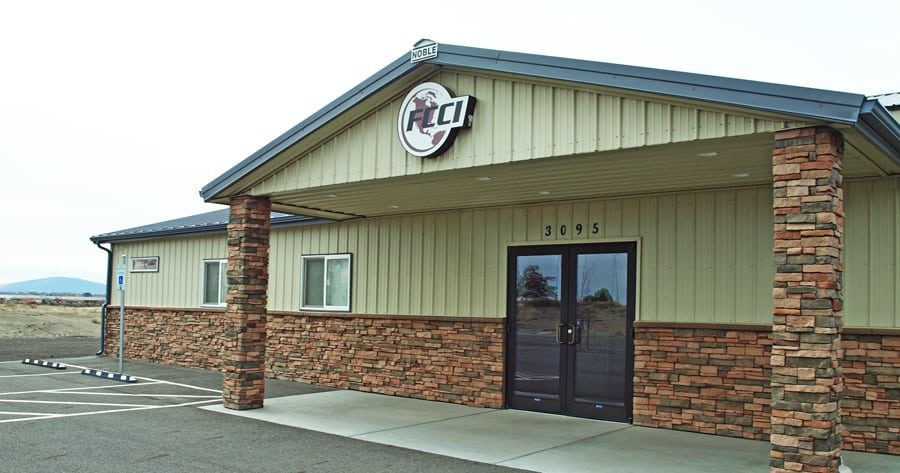
Home » Richland company opens new fabrication shop to meet local demand
Richland company opens new fabrication shop to meet local demand

February 14, 2018
FCCI working to fabricate pipeline for Hanford tank farm project
The welding torches are ablaze in a Richland company’s new fabrication shop where highly-skilled welders are making pipeline components for the water and chemical distribution system for the Hanford tank farm.
Fluid Controls and Components Inc., or FCCI, specializes in nuclear-certified piping materials, valves, instrumentation, machined components, fasteners and engineering services.
The company provides engineered solutions, fabricates client designs and offers quality assurance services.
FCCI completed construction of a new 8,000-square-foot fabrication shop, located directly behind its headquarters at 3095 Kingsgate Way in Richland, last September. It has plans to expand into the food processing and agricultural sectors this year.
FCCI’s welders are certified in a number of welding processes and for a range of materials, such as stainless steel, carbon steel and various alloys.
“The quality of our fabrication is unmatched,” said John Watson, vice president of FCCI.
“We get a lot of business because of that quality. … Big companies come back time and time again because they trust us,” said co-owner Russ Watson, who runs the company with his wife, Bonnie.
As a result, and also because FCCI is one of a handful of local companies that can provide commercial-grade work in accordance with the American Society of Mechanical Engineers’ Nuclear Quality Assurance-1, or NQA-1, standards, FCCI has become an integral partner with several major Department of Energy contractors at the Hanford site, such as Bechtel National, CH2M and Washington River Protection Solutions.
“We utilize FCCI for a lot of our fabrications,” said Dan Hall, a corporate spokesperson for American Electric Inc., or AEI, a Richland-based electrical contractor acting as a general contractor at the Hanford tank farm.
AEI commissioned FCCI to build the pipeline for the tank farm.
In 2009, Hall worked cooperatively with FCCI on a Department of Defense project in which FCCI provided equipment and materials. Hall said he’s returned to FCCI for both DOE projects and those in the civilian sector.
“They’re an NQA-1 supplier of equipment, so they are great to work with because they have all the paperwork to meet government requirements.
“There’s no question when you have them supply material or do work, because they’ve already reached that high expectation; it’s a good pedigree to have. Not a lot of suppliers or fabricators around have that, and they do,” Hall said.
NQA-1 testing and certification entails a battery of physical tests to determine if a part or product is nuclear grade and fit for its intended use. Tests include chemical analysis, hardness, ultrasonic, pressure and X-raying to ensure a flawless product.
Parts must pass all of these critical tests to be cleared for use.
In addition to the chemical and water distribution pipeline, FCCI has fabricated work platforms and steel burial boxes for material pulled out of the tanks under AEI’s contracts.
FCCI’s team of 15 employees has tackled numerous projects nationwide, primarily DOD and DOE projects, involving chemical warfare and nuclear demilitarization programs, which involve the destruction of old chemical warfare agents.
The company also has contributed to the Oak Ridge, Tennessee’s Savannah River site, Pueblo and Blue Grass agent-destruction pilot plants, and Iraq reconstruction projects.
One of the FCCI’s most recent projects involved the fabrication of a telescopic lifting rig for a nuclear plant in Louisiana. The equipment was designed to lift out the vessel dome covering the reactor core.
“No one else in the country would build it; it was very complex,” John Watson said.
Other notable projects include its involvement with the DOD’s ground-based mid-course defense program in Alaska, as well as the manufacture of fabricated components for a Tri-City research facility that processes the radioactive isotope, tritium.
“We recognize that we’re on the back end of the Manhattan Project, and we’re proud to be a part of that societal contribution,” Russ Watson said. “It’s got to get cleaned up.”
FCCI’s contributions to the ongoing Hanford site remediation haven’t gone unnoticed either.
In 2014 and 2016, FCCI received Bechtel’s Small Business Supplier Award out of more than 30 nominees selected from more than 2,000 Bechtel contractors. John Watson and FCCI’s office manager, Adrianne Hall, traveled to Washington, D.C., to accept the awards.
“Over the years, we’ve developed strategies and skills to handle each project,” Russ Watson said. “If we weren’t capable, we wouldn’t be here.”
He said FCCI’s success has been thanks to his team’s “fanatical attention to details.”
“Our most important asset is of course our customer base, but also our employees. Without their commitment and dedication, we wouldn’t have the customers. Our employees are held in the highest regard,” Russ Watson said.
FCCI has been in the Tri-Cities since 2011, but began in 2003 in Tacoma on the mezzanine floor of a former 1948 Buick dealership.
Russ Watson had been involved in the petrochemical business since the early 1970s and remained in heavy industry and oil until 2003, when he resigned and founded FCCI with his wife.
“Our first purchase order was for $900,” Russ Watson said. “We made a profit of $90, and the order was written out all by hand — we had no (computers) in yet. That Buick dealership took us to where we are today — through perseverance.”
The small, woman-owned business holds a Historically Underutilized Business Zone designation. Known as a HUBZone, this U.S. Small Business Administration program helps small businesses in urban and rural areas gain preferential access to federal procurement opportunities.
FCCI opened its fabrication division two years ago, and operated out of a space at the Big Pasco Industrial Center until construction of its new shop was complete.
In 2017, FCCI lost one of its founding employees, who was later an owner, Randy Peterson, before the new shop was completed.
“Randy was a pillar in this company and a tremendous individual,” Russ Watson said. “He was enormously respected in the industry, and we experienced a great loss when he passed. He possessed qualities that were extremely rare.”
As FCCI looks forward, diversification is a focus. John Watson said a major component of FCCI’s business plan includes a focus on working with clients in the food processing and agricultural sectors due to FCCI’s familiarity with stainless steel components.
A recent partnership with a local distillery represents FCCI’s first non-government project in Eastern Washington.
“We’re confident in our ability because of our collective industry experience,” John Watson said.
Local News
KEYWORDS february 2018




